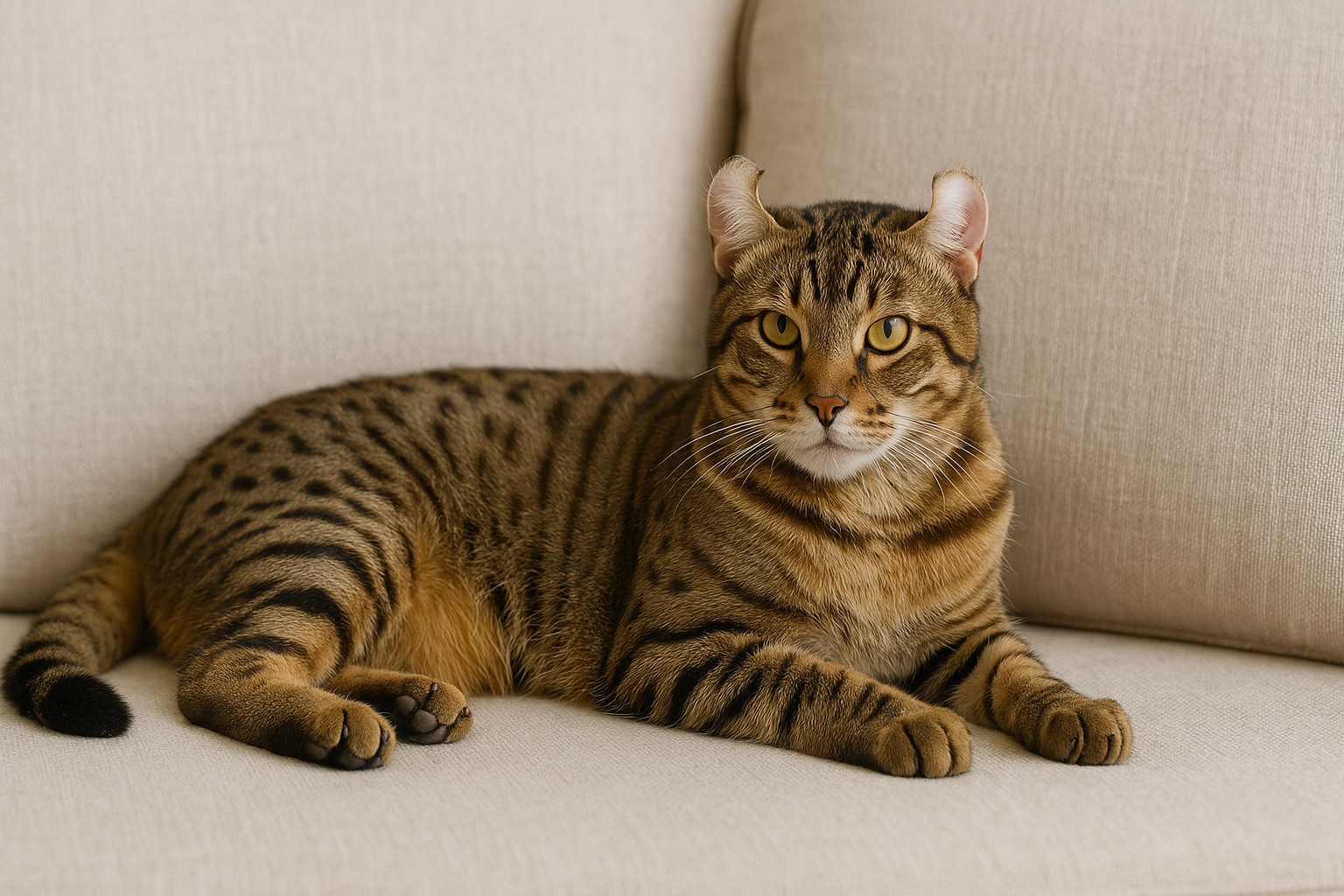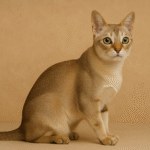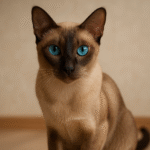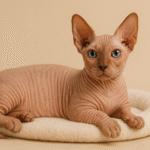If you’re looking for a cat that’s playful, muscular, and has a wild look without the wild temperament, the Highlander Cat might be your perfect match. With its curled ears, bobbed tail, and striking coat patterns, this breed is as eye-catching as it is affectionate.
Despite their exotic appearance, Highlanders are known for being gentle giants. They’re friendly, outgoing, and surprisingly laid-back. They’re confident, cuddly, and full of personality. Let’s take a closer look at what makes the Highlander cat such a standout companion.
Quick Breed Facts
- Origin: United States
- Breed registries: TICA (Advanced New Breed)
- Weight range: 10–20 pounds
- Lifespan: 10–15 years
- Coat: Short or long
- Colors and patterns: Spotted tabby, classic tabby, lynx points, and more
- Eye color: Varies (typically gold, green, or blue)
- Grooming: Low to moderate
- Activity level: High
- Affection level: High
- Vocality: Moderate
- Good with children: Yes
- Good with other pets: Usually
History & Origin
The Highlander Cat is a fairly new breed that began in the early 2000s in the United States. It was developed from a cross between the Jungle Curl and the Desert Lynx, two experimental hybrids known for their wild appearance. One of the most distinctive features passed down was the curled ears. Even though the breed looks exotic, there is no wildcat DNA involved. There are no servals or bobcats in its background, just domestic charm with a wild twist.
Breeders set out to create a cat that had the look of a bobcat but the personality of a sweet, social companion. And they pulled it off. The Highlander is now recognized by TICA as an Advanced New Breed and is quickly gaining fans for its playful personality and unique appearance.
Personality & Temperament
Don’t let the rugged looks fool you. Highlanders are total softies at heart. They’re social, people-loving cats who enjoy playing, exploring, and trailing their humans around the house. A lot of owners say they’re more like dogs when it comes to loyalty and energy.
These cats are confident and curious. They’ll often greet visitors at the door, peek into whatever you’re doing, and find creative ways to make you laugh. Whether it’s splashing in their water bowl or launching off the furniture, they know how to keep things interesting. They usually get along well with kids and other pets, making them a fun and adaptable addition to many homes.
Activity & Play
The Highlander is a high-energy cat that lives for play and adventure. They’re climbers, jumpers, and chasers. And when they want your attention, they’ll make sure you know it. Give them interactive toys, puzzle feeders, and a tall cat tree, and you’ll have one happy cat on your hands.
With all that muscle and energy, these cats need daily exercise to stay in top shape. They’re not the kind to lounge in your lap all afternoon. If you’ve ever wanted a cat who doubles as a personal trainer, this might be your perfect match.
Grooming & Shedding
How much grooming your Highlander needs depends on the type of coat they have. Shorthaired Highlanders are pretty low-maintenance and usually only need a quick brushing once a week. Longhaired Highlanders need a little more attention. Brushing two or three times a week will help keep their coat smooth and free of tangles.
Shedding is moderate overall, but it can increase during seasonal changes. Grooming isn’t just about managing fur. Those signature curled ears can collect dust or debris, so it’s a good idea to check them during your regular brushing sessions to keep everything clean and comfortable.
Health & Lifespan
Highlanders are generally a healthy breed without any major genetic issues tied to their bloodline. On average, they live around 10 to 15 years, and with good care, some can even go beyond that.

Because they’re so muscular and active, some Highlanders may put a little extra stress on their joints as they age. Giving them a soft, supportive bed and keeping their weight in check can go a long way in keeping them comfy and mobile in their senior years.
Family Compatibility
Highlanders tend to be fantastic family cats. Their playful, social nature makes them a great match for homes with kids, especially when the children know how to treat animals gently. These cats love to be in the middle of everything. Whether they’re following the kids around the house, joining in a game, or claiming a front-row seat during movie night, they want to be part of the fun.
They also get along well with other pets, especially when introduced slowly and with care. Highlanders are confident and adaptable, which makes it easier for them to bond with dogs and other cats. Early socialization helps everything go smoothly. If you’re looking for a fun and affectionate companion who can thrive in a busy household, the Highlander is a great choice.
Recommended Supplies
Highlanders are full of energy and curiosity, so they need a home setup that keeps up with them. A sturdy, multi-level cat tree gives them a safe space to climb and perch, while interactive toys and puzzle feeders help keep their mind sharp. Window hammocks, cat tunnels, and even wall-mounted shelves can be great additions to their indoor playground.
Highlander Cat Price
The Highlander cat price can vary quite a bit depending on the breeder, pedigree, and whether you’re getting a pet or show-quality kitten. In general, you can expect to pay somewhere between $800 and $2,000.
If you’re going through a breeder, be sure they focus on health testing and early socialization. You might also get lucky and find a Highlander through a rescue or breed-specific shelter. While they’re rare, they do occasionally show up looking for a second chance at a forever home.
Is the Highlander Cat Right for You?
If you’re looking for a bold, playful, and incredibly loyal feline companion, the Highlander might be your perfect match. They bring loads of personality and athleticism to the table, all wrapped up in a one-of-a-kind look.
That said, this isn’t a nap-all-day kind of cat. Highlanders need stimulation, space, and someone who can keep up with their active lifestyle. But if you’re ready for the challenge, you’ll gain a smart, silly, and unforgettable friend for life.
Highlander Cat FAQs
What is the Highlander cat’s temperament like?
Highlanders are social butterflies with a playful streak. They love attention, enjoy being part of the action, and are always curious about what you’re up to.
Are Highlander cats hypoallergenic?
Not quite. Highlanders do shed and produce the same allergens as most other breeds, so they’re not the best choice for allergy sufferers.
How big do Highlander cats get?
They’re a large, muscular breed. Males can weigh up to 20 pounds, and even the females are usually pretty solid. Don’t be surprised if they fill up your whole lap. Some will even stretch out across the couch.
Do Highlander cats like water?
Yep! Many Highlanders are total goofballs when it comes to water. Sinks, bathtubs, and dripping faucets often catch their attention. If it splashes or dribbles, they’ll probably want to investigate.







